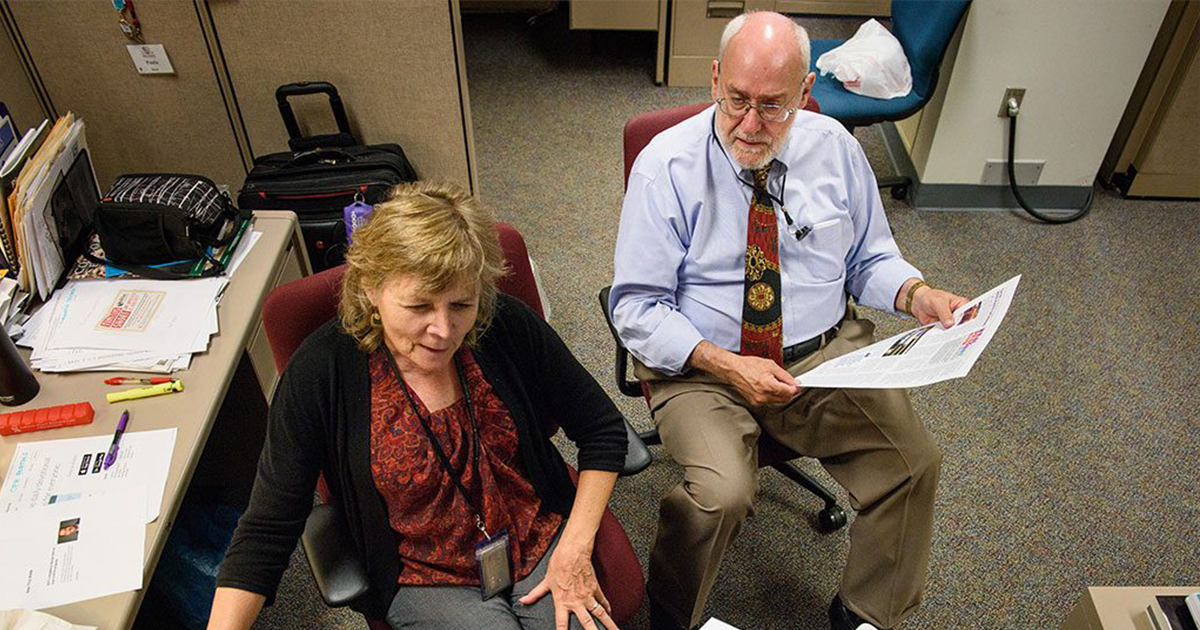
By Megan Mertz
For 40 years, the name Joe Isenhower Jr. was a familiar byline in the pages of Reporter. He began working as a writer for The Lutheran Church—Missouri Synod in 1973, amid the deep theological divide that would eventually lead to the Walkout at Concordia Seminary, St. Louis, just one year later.
Over the years, Isenhower took on more responsibility with Reporter, eventually serving as its managing editor until his retirement in 2017. As the newspaper celebrates its 50th anniversary this year, Isenhower took a moment to look back on his many years involved in publishing the Synod’s news.
Tell me about your early involvement with Reporter.
I was not directly involved in setting up Reporter [when it started 50 years ago]. It was based down at Concordia Publishing House at the time. … When the Communications Department was formed around 1982, I did some writing for it. It eventually took on a summary format, where stories were no longer than 75 to 100 words. Then Reporter Alive was added, which were more in-depth stories that accompanied the blurbs. I wrote a few of those, but I did not become more involved until I was rehired [after spending six years working for Concordia Seminary, St. Louis,] to work with Reporter in 1997.
What were some of the biggest changes that took place during your tenure?
At one time, the feeling was that people didn’t want to read long stories. But as times changed, the thought about how people wanted to read changed too. Reporter Alive went in-depth on certain stories. And then when online came along, that changed it all again. There were no constraints on length online. So, you wrote the long version first, and then you just cut it down for print. And people could add comments online.
Officially, within the last 20 years, the decision was made that Reporter Online would be the publication of record. Staff made that choice because stories could be posted online whenever they were ready, and they were often more in-depth than the print versions.
Do any stories stand out to you from that time?
I was really impressed when Paula [Schlueter Ross, longtime Reporter writer and editor,] was able to get a story done quickly about Rev. Bill Wrede rushing to the scene on 9/11. He happened to be in the area, and he provided chaplaincy services on the scene [in New York City]. It won an Associated Church Press [ACP] award. We were able to get it into print quickly. I guess that must have been the October 2001 edition. (Editor’s note: The issue was the September 2001 edition. It went to print on Sept. 12, 2001.]
Also, I think it has been especially good that Reporter could provide information and news about resources that can be of help to LCMS congregations and church leaders. For instance, I felt the convention issue gave a good digest of what had happened. I was always proud that we could get the word out that way, because certainly it was before the Convention Proceedings came out. … When I first came to the Synod, there were probably 35 to 40 people on the [convention] newsroom staff. But that was during the controversy of the ’60s and ’70s. Plus, we were sending out news releases that we had mimeographed. So, you had to have a print shop and a mailroom in the newsroom. Boy, things have changed!
As we’ve looked back at old issues, we’ve seen how the work of the church really remains the same over the decades. Would you agree with that?
Oh sure. When Reporter was started, there was a concern about getting the word out from Synod about our doctrine and practice and things related to the controversy at the time. Those involved in Seminex were really putting stuff out. They had their own newspaper at one time, and it was one of the main reasons Reporter was instituted.
Early on, [the Synod administration] must have seen that Reporter was effective. We’d go to ACP and see publications come and go. A lot of denominations had dropped publications, but The Lutheran Witness and Reporter kept going. We conducted surveys of our constituents at different times over the years, and a lot of the decision to keep it going was based on that research. Reporter continues to fulfill a need.
Posted Oct. 21, 2024